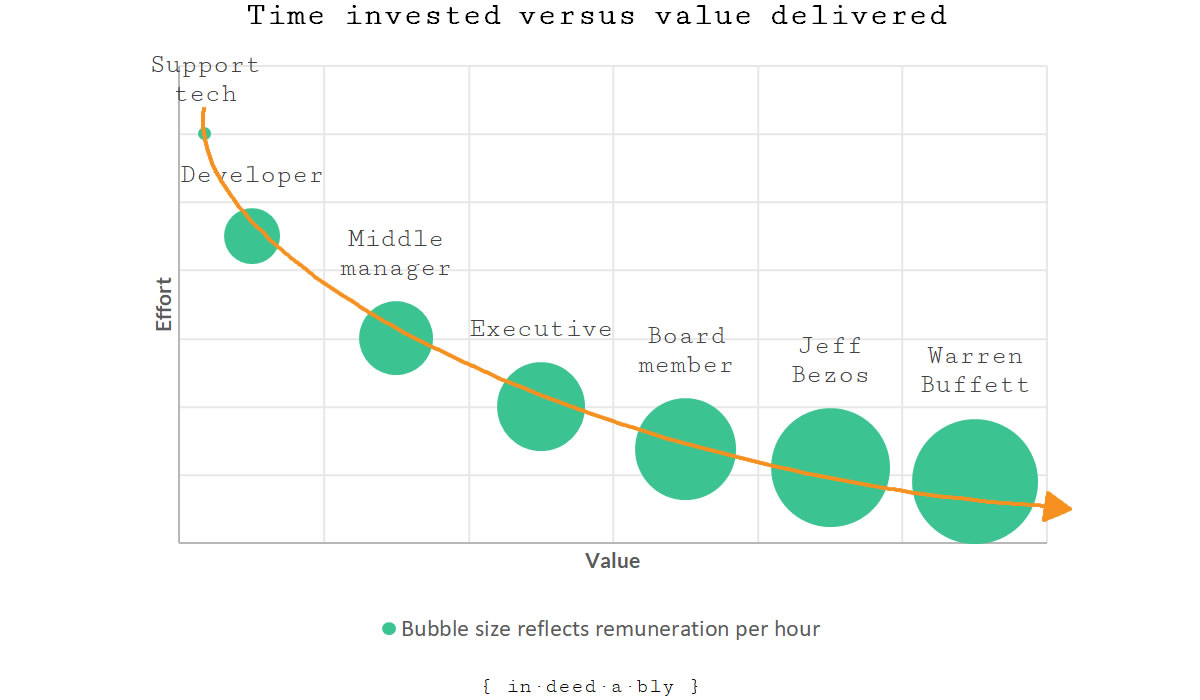A battered Fedex padded envelope covered in Japanese pictographs landed on my desk with a thud.
I looked up and saw my “strong and assertive” boss standing over me, looking like somebody had just pissed in her Cheerios.
In the no-nonsense tone of a drill sergeant, she fired off instructions:
“Rebuild a computer with that. Install your application. Be ready to demonstrate it working faultlessly at tomorrow’s 08:00 Managing Director’s meeting. Fuck it up and you are fired!”
My boss turned on her stilettoed heel and teetered back into her office. She didn’t wait for comment or consent.
She didn’t have to.
They owned me.
She knew it, and I knew it.
Challenging times
The dot-com boom had busted. The pipeline of pending programmes and projects had dried up. The job market was flooded with out of work computer geeks, but nobody was hiring.
Like an oncoming train, the end date on my (slightly dodgy) work visa had rapidly approached. Given the dire state of the job market I was faced with a stark choice: sell my soul for an employer-sponsored working visa, or return home with my tail between my legs.
My business still had a couple of small ongoing engagements, but the client funding for the next major project we had successfully tendered for had been withdrawn. That put paid to the possibility of an obtaining an entrepreneur visa.
I lacked the sizeable cash reserves required to purchase an investor visa.
My ancestors were from the wrong part of the world to qualify for an ancestry visa.
I couldn’t afford to ride out the storm as a professional post-graduate student.
A quickie wedding for a passport was always an option, but the couple of people I knew who ventured down that road had eventually been found out, fined, and deported.
That left bending the knee to an employer who was willing to run the gauntlet that is the visa application process. This was time-consuming and expensive, with a far from certain outcome.

Determination like Sisyphus. Image credit: Topi_Pigula.
Finding such an employer is challenging at the best of times.
Finding one during a difficult economy, combined with the competitive pressures of a saturated job market, required levels of sheer bloody-minded persistence and determination normally only associated with Sisyphus.
Eventually I did find such an employer: a large American investment bank.
Opportunity cost
The glossy recruitment brochures projected the image of the bank being one big happy, diverse, and well-dressed family. Talent was nurtured. Staff were viewed as a long-term investment. They loved feel-good stories of Chief Executive Officers who started out in the mail room; and strove to foster that style of career progression for every new hire.
At the end of the interview my future boss, a fellow ex-pat, explained the facts of life to me.
A new family member wasn’t being introduced, an interchangeable cog was being replaced in her machine.
There was no talent being nurtured. She was throwing fresh meat into a shark tank.
She didn’t give a toss about my future career progression. I was the fatted cow, to be bled dry until I either died or the gig was up.

Dobby the house elf. Image credit: Harry Potter Wikia.
In return for a sponsored work visa, she was buying herself “Dobby the house elf” (from Harry Potter). An indentured servant. A willing slave.
I would do whatever she asked, no matter how unreasonable, without complaint.
If I didn’t like it I would suck it up.
Or I could fuck off back to my own country.
Quite the motivational speech! At least she was upfront and brutally honest, I’ll give her that.
The offer I received included a salary at the lower end of the bank’s pay scale, less than half what my business had earned me the year before. It was a bitter pill to swallow, but meant that I could remain in the country.
Trapped in visa hell
Being trapped in visa hell is a topic seldom discussed in polite company. It is a situation that the vast majority of the population simply never encounter, because (apart from the occasional holiday) they spend their lives in the country of their birth.
My girlfriend had faced a similar dilemma. She had found an employer willing to sponsor her. After completing the required mountain of paperwork, she submitted the application and her passport to the visa authorities.
Four months later the authorities had not yet completed processing her application.
She missed her sister’s wedding as a result, with all the familial fallout that inevitably follows.
She did have the option of requesting her passport back, but doing so would withdraw her visa application.
The tightening of the job market had seen a similar tightening of the working visa rules. Her vocation no longer appeared on the skills shortage list.
In other words, she would no longer qualify. Had she attended the wedding, it would have been a one-way trip.
Several months later her visa was eventually approved. If only her sister’s smile had returned as quickly!
A day without end
Arching my back in a stretch that would make a domestic cat envious, I glanced at my watch.
It read 23:14.
On a Wednesday.
I was still the office. Again!
Such is life working for a large American investment bank. The working hours are on the farcical side of ridiculous!
Employees are late if they arrived after 08:00 in the morning.
Staff are considered lazy part-timers if they dare depart before their manager in the evening.
Productivity is measured by the hours you spend at your desk, not what you actually achieve.

Learning the hard way. Image credit: OpenClipart-Vectors.
I glanced at my computer screen. I couldn’t read any of the text (it was in Kanji!), but the progress bar indicated the software installation had roughly 15 minutes remaining.
Some genius Managing Director had made the sort of idle middle management meeting boast that was designed to show up his peers. Like many such boasts, it was baseless and made up on the spot.
In this case, a rival called him out on it, graciously accepting the kind offer to seamlessly roll out the application I was responsible to thousands of computers in Japan… by the end of the week!
So there I found myself, at nearly midnight, attempting to install Microsoft Windows in Japanese on a recently stolen computer.
I failed to make it home that night, but I breathed a mighty sigh of relief when I was finally able to get my application to successfully run (in Japanese) on the demonstration machine around 05:30.
My boss arrived at the office shortly before 07:00. She stalked past me without comment, then a couple of minutes later shrilly summoned me into her office.
As I walked through the door I informed her the application was successfully running in Japanese.
She looked blankly at me for a couple of seconds, then laughed.
“The bank’s change management process would never have allowed an application to be rolled out to thousands of machines without rigorous regression testing, and that takes months to line up.”
I goldfished.
“You were building that machine to ensure that the Managing Director wouldn’t look silly, on the off chance anyone ever follows up on the meeting actions. There were no minutes taken, so chances are that everyone has already forgotten.”
My shoulders slumped. She had been making me jump through hoops just for sport. Again.
“Now go buy me a croissant and a double espresso. Then change your shirt and have a shave. This is an investment bank, not a homeless shelter, and you are a fucking disgrace!”
Playing the statue to her seagull was an unpleasant business indeed.
A decision (or three) a day to rule the world
Recently I watched Jeff Bezos being interviewed at The Economic Club. He was being asked about his approach to work and how he managed his companies.
One of his responses was intriguing:
“… people will stop me and say congratulations on your quarter and I say thank you. But what I’m really thinking is that quarter was big three years ago, right now I’m working on a quarter that’s going to reveal itself in 2021 sometime. And that’s what you need to be doing, you need to be out sort of, you know, two or three years in advance.
And if you are – and then, why do I need to make a hundred decisions today? If I make, like, three good decisions a day, that’s enough. And they should just be as high a quality as I can make them. Warren Buffett says he’s good if he makes three good decisions a year.”
In return for making those three good decisions each day and thinking about the future, Bezos received a salary USD$81,840 last year. Warren Buffett received a USD$100,000 salary for his three good decisions in 2017.
Both made more than double what I received for working those 16 hour days at the bank!
Now don’t get me wrong, I think the impact and reach of Bezos’ achievements over the last 20 years are nothing short of extraordinary. He deserves his salary, his stock options, and his success.
Though my salary had been well above median earnings, the amount I received per hour of my life invested working at the bank was considerably less than minimum wage!
Opportunity cost in action: a high price indeed to pay for a visa.
The higher you go, the less you do
One thing I have observed over the years is that those towards the bottom end of the earnings spectrum work hard.
They graft.
They grind.
They hustle.
However when viewed through a “value of time” lens, all that feverish activity yields disappointedly low results. Keep that in mind the next time you hear some blogger or podcaster preaching the virtues of “always be hustling”! The siren song of simple answers makes for an easier sale, but the reality seldom lives up to the grand promises made.
Inverse correlation: Value and effort
By contrast the higher up the corporate ladder I climbed, the less actual work I had to do.
Like many entering the technology game, my early roles were support oriented and reactive. They involved a lot of “hurry up and wait”. Long periods of relative inactivity, broken up by frenetic bursts of feverish activity involving lots of shouting, band-aids and duct tape.
The hours were often unreasonable. Night shifts. Weekends. Being on-call, and woken (usually mistakenly) during the night because of a flashing red light on a command and control console.
Lots of responsibility for relatively low pay.
Before long I escaped the support work in favour of development. Now it was my buggy code that caused those flashing red lights, and ruined some unlucky support tech’s beauty sleep!
Then I led, and later managed, teams who performed those activities.
In time I managed account managers, who in turn liaised with the outsourced teams performing those activities.
Eventually I managed the managers of those account managers. That sounds complicated and ridiculous, because it was!
The actual activities being performed were comparable to those I had done all those years ago. Only now they were performed half a world away, by some faceless techie, working comparable hours to my investment banking job. In return for their efforts, they received a weekly wage that probably couldn’t fund a round of bacon sandwiches in the City.
Each rung climbed involved doing less; but listening, thinking, planning and deciding more.
When viewed through that same “value of time” lens, the volume of value-adding work decreased, but the value of my contribution increased significantly.

Busy work is theft
Unfortunately the remainder of my time was often consumed by an endless array of busy work.
- More meetings.
- More negotiation.
- More coordinating.
- More cat herding.
- More shouting at people.
- More handholding of senior management.
These low value, yet time-consuming, activities are what many career middle managers use to fill out their calendar in an effort to look busy.
By the time you reach the top: the goals are understood; the direction of travel is defined; and the final destination is known.
Action becomes the exception, rather than the default.
A minor adjustment in course here.
A small change in speed there.
A tweak to the scarce resource allocation balance.
You’ve designed and implemented the systems and processes that collectively form the machine that is your business.
You’ve hired and trained the best staff you can find, to operate and govern that machine for you. Then you have got out of their way, to let them get on with doing what they do well.
In fact there are many parallels with the approach required for successful personal finance!
Leading and managing aren’t the same thing
Your job becomes keeping a watchful eye on the horizon. To chart the course the business will travel in the medium to long-term. To serve as the arbitrator of last resort on those rare occasions that your competent trusted staff genuinely don’t know what to do and can’t figure it out themselves. To not meddle or micromanage.
This is how Jeff Bezos can get away with making just three important decisions per day, and Warren Buffett his three good decisions per year. When the systems function and the processes work, there simply isn’t that much genuinely value adding activity left for the person in charge to do.
It is also how Jeff Bezos can free up the time required to get fit, build spaceships, and operate a leading daily newspaper… all while running the world’s largest retailer.
References
- Amazon.com Inc (2018), ‘Proxy Statement Pursuant to Section 14(a) of the Securities Exchange Act of 1934‘
- Berkshire Hathaway (2017), ‘Proxy Statement Pursuant to Section 14(a) of the Securities Exchange Act of 1934‘
- CNBC (2018). ‘Jeff Bezos At The Economic Club Of Washington (9/13/18)‘
- Payscale (2018), ‘India: Average Support Analyst, Information Technology (IT) Salary‘
- Payscale (2018), ‘United States: Average Chief Executive Officer (CEO) Salary‘
- Payscale (2018), ‘United States: Average Member of the Board of Directors Salary‘
- Payscale (2018), ‘United States: Average Software Developer Salary‘
- Payscale (2018), ‘United States: Average Technical Delivery Manager Salary‘
- Rowling, J.K. (1997), ‘Harry Potter and the Philosopher’s Stone‘, Bloomsbury
- The Economic Club (2018). ‘Jeff Bezos. CEO and Founder: Amazon (transcript)‘


[HCF] 11 December 2018
Great post. When reading such stories I feel lucky that I never had this kind of horrible bosses. Most of them were fair, cool guys and even the worst was just “meh” neutral. I had some after hours fixing also but no such madness what they forced you to do. Does this mean that the worst part is still before me? 😀
{in·deed·a·bly} 11 December 2018 — Post author
Thanks HCF.
It was my own decisions that put me in such a weak negotiating position, I was only as trapped as a I chose to be. In this particular case my boss was actually quite good at her job, her sadistic streak helped her survive (thrive even) in that shark tank environment. That didn’t make working for her an enjoyable experience, but I did learn a lot about power and control.
Bosses are just people. There are always going to be good ones, bad ones, inspiring ones, and incompetent ones.
In my experience an organisation’s culture plays a big part in how bad a boss can be, and how many bad bosses there are. Politically driven organisations with a toxic atmospheres tend to breed them.
The charity sector, real estate, and retail tend to have a lot of them. I suspect this is partly because they don’t require any formal skills or qualifications to gain entry. That makes everyone easy to replace, which leaves many a boss seeing potential threats or rivals amongst their more capable employees.
[HCF] 11 December 2018
Agree with you. It not that we don’t have a variety of them just I was never under the direct management of one. We had our share of incompetent ones upper in the hierarchy but fortunately we almost left them all behind.
Interestingly I met my most inspiring boss when working part time back while attending university. The guy had a mind-blowing amount of life experience and wisdom under his belt. He was an early days backpacker and vagabond. I would say he had seen from the world what worth seeing. His stories ranged from working as a street chef in China, through living without money homeless on the streets in India to smuggling cigars from Cuba. It blew my mind as these stories were not made up (I have seen the photos), some of them were to too weird to just make it up. I have also heard him speaking on at least ten languages if not more. His lessons made a huge impact on my mindset, I think of it as a blessing that he was my first boss at a very problematic age of mine.
{in·deed·a·bly} 11 December 2018 — Post author
Wow, 10 languages is impressive.
I used to be able to order a beer and say I love you in 7 languages. All you need for a fun night out really…
Moriah Joy 13 December 2018
Oh my gosh… that experience sounds horrendous! I can’t imagine having to be put through that. I had a boss cuss me out once, and I put in my two weeks notice. But I have a lot more leverage because I’m an American citizen… props to you for sticking that hell hole out!
{in·deed·a·bly} 13 December 2018 — Post author
Thanks for reading Moriah. Well done for sticking up for yourself.
With the benefit of many year’s hindsight, I think it was more about opportunity cost and prioritisation than leverage. I did what I felt I needed to at the time, sucking it up in the short term for a perceived greater good.
Today I wouldn’t compromise myself like that again, but I also wouldn’t let myself end up in that sort of weak negotiating position again either!